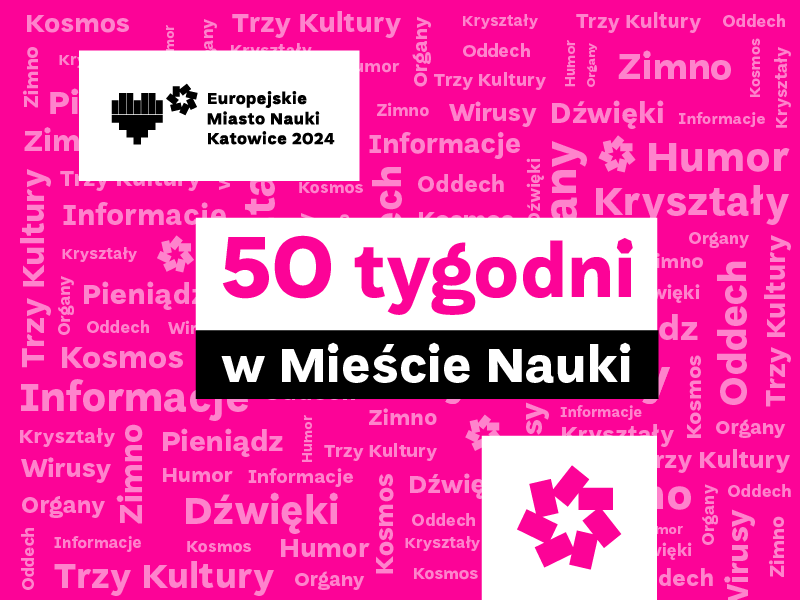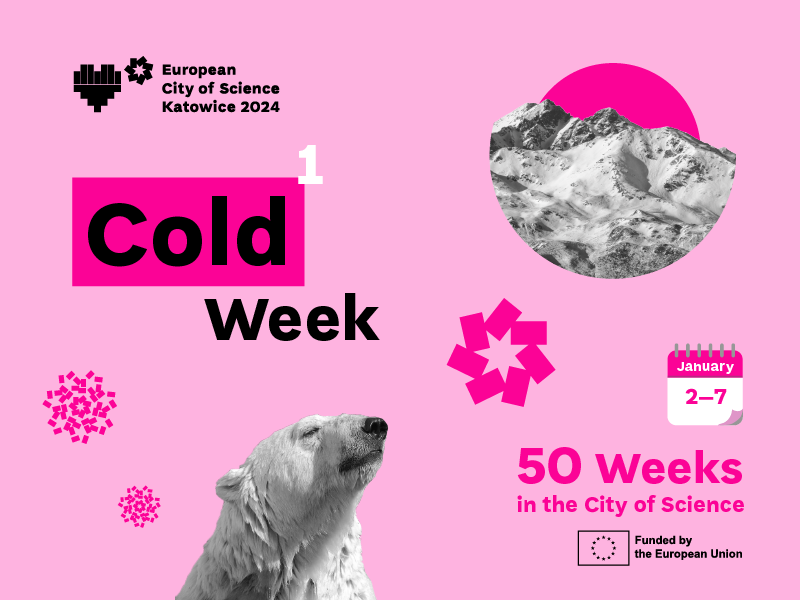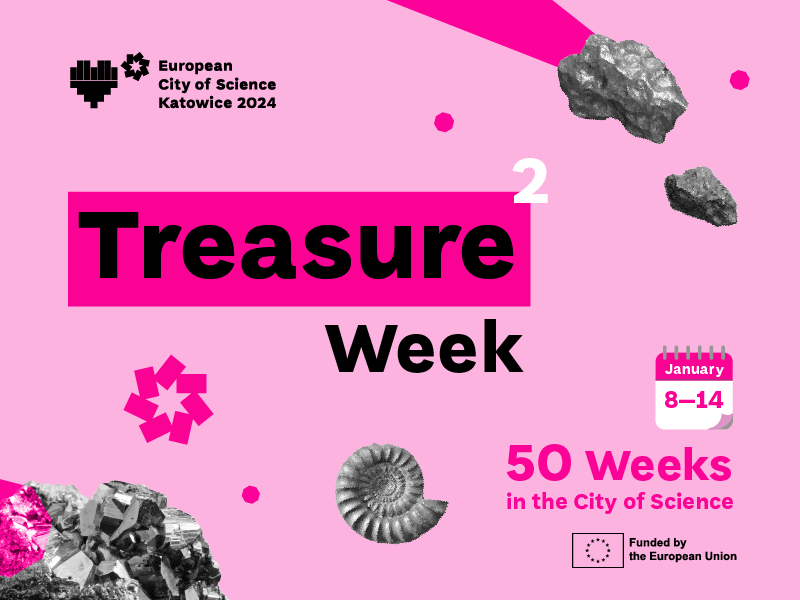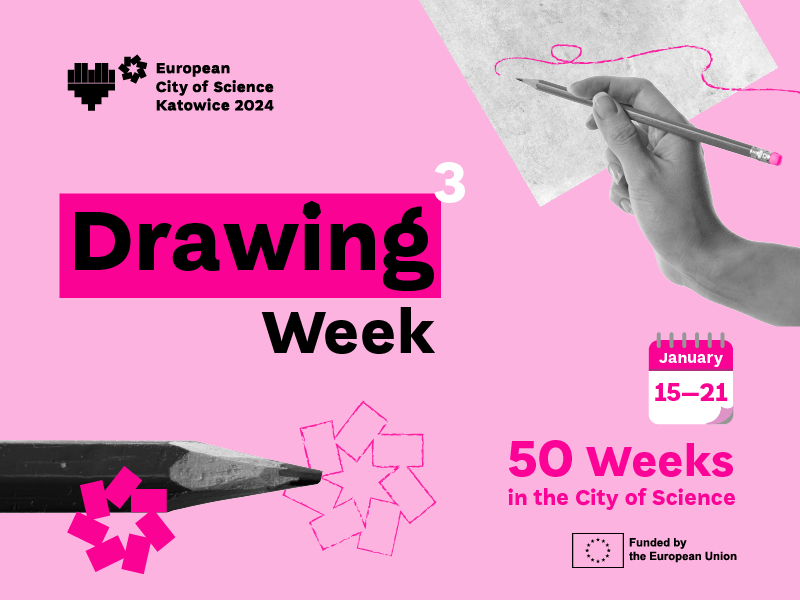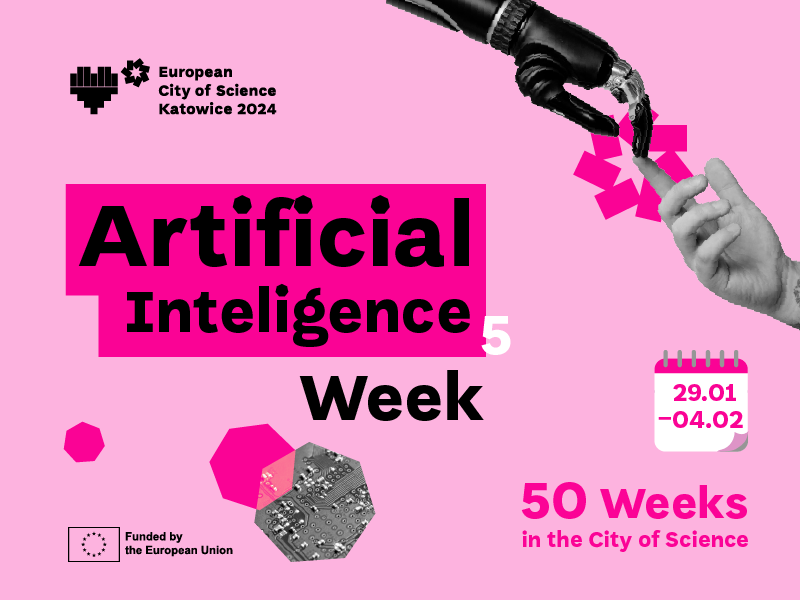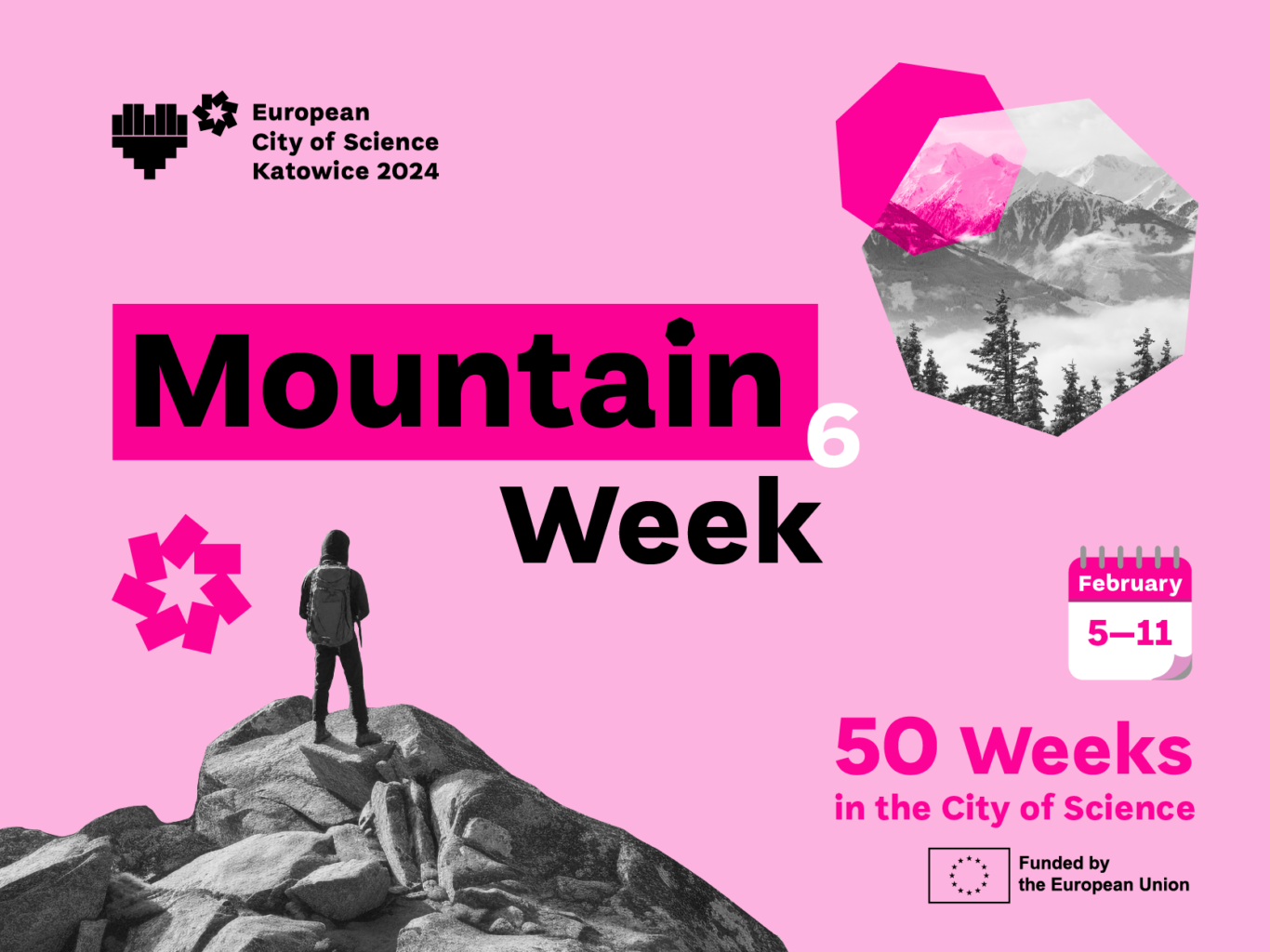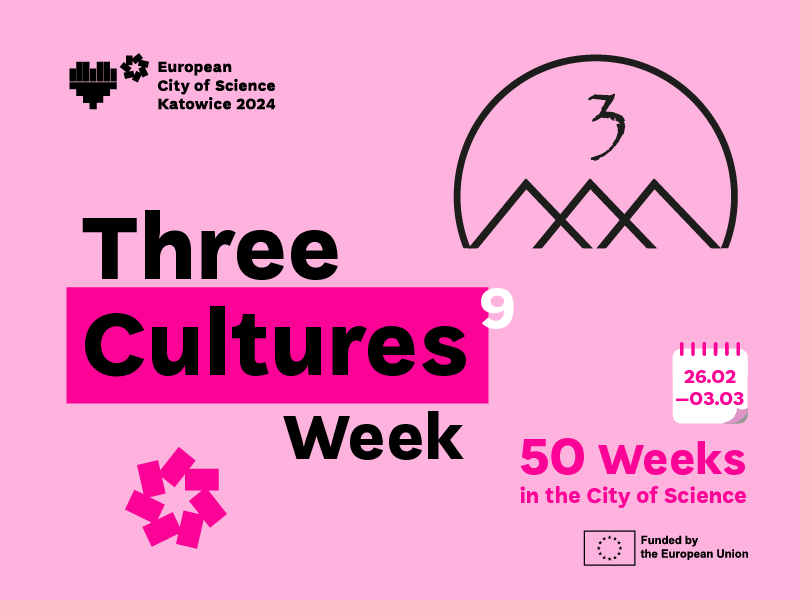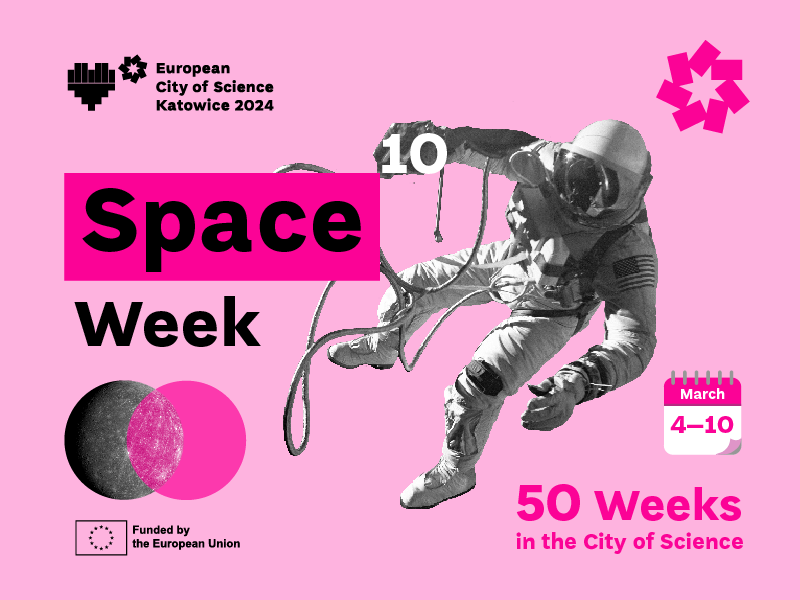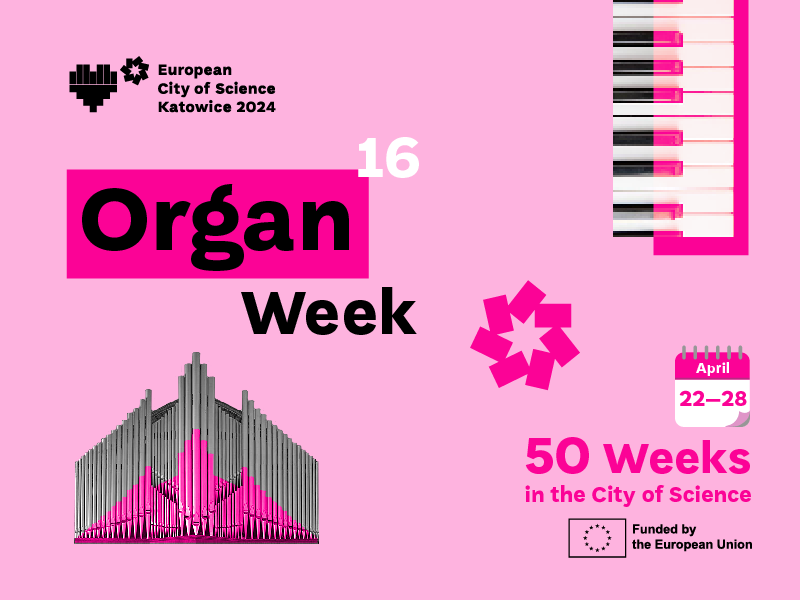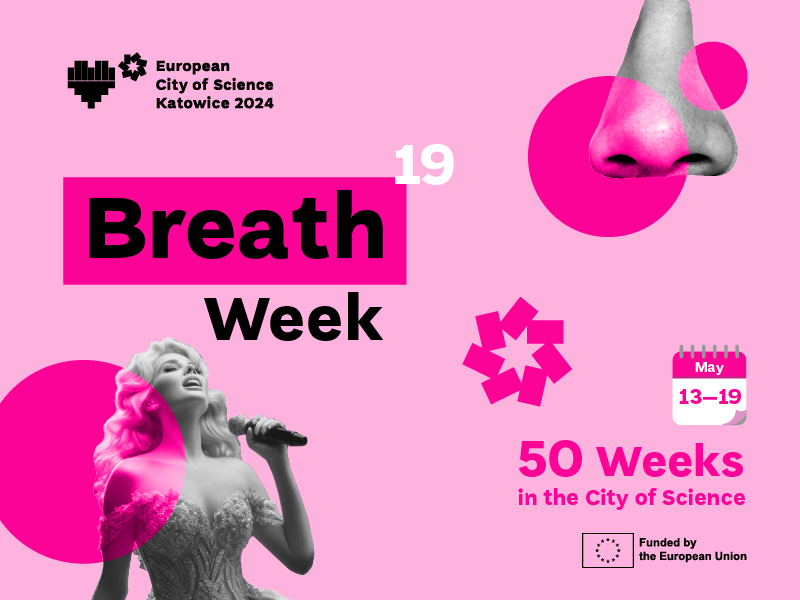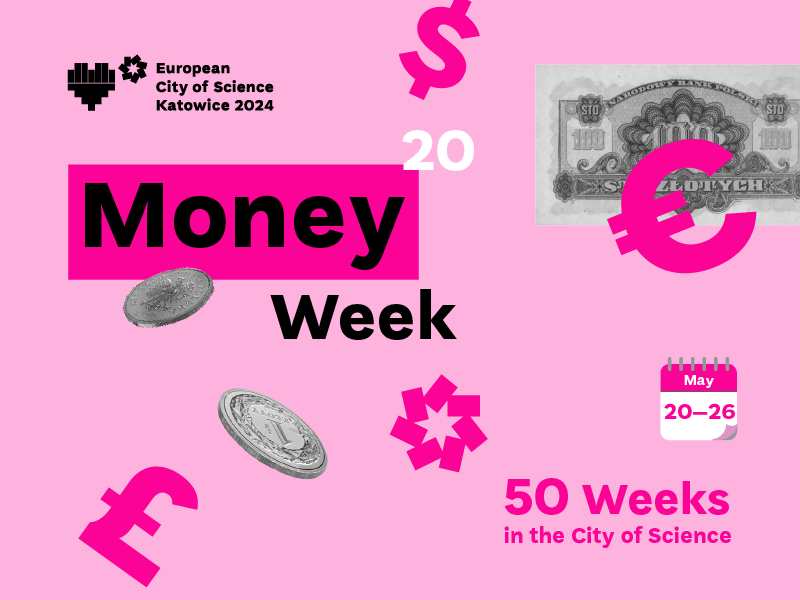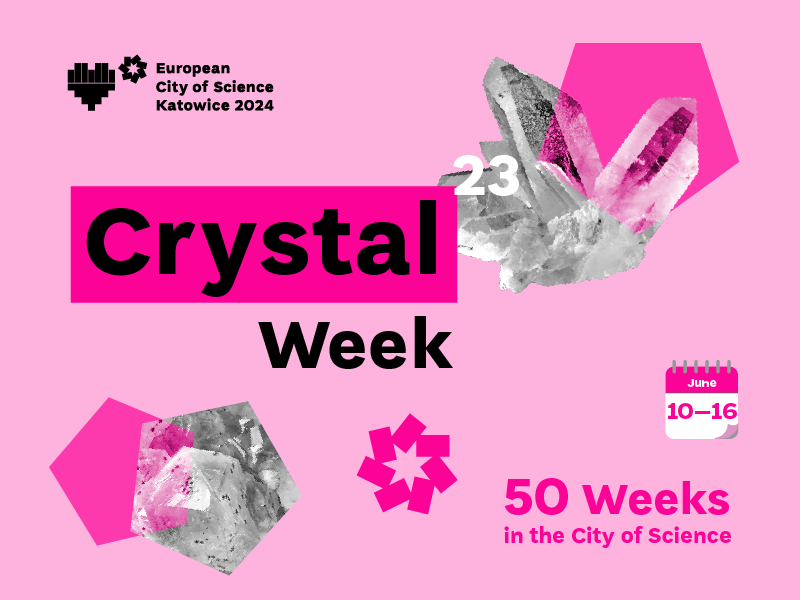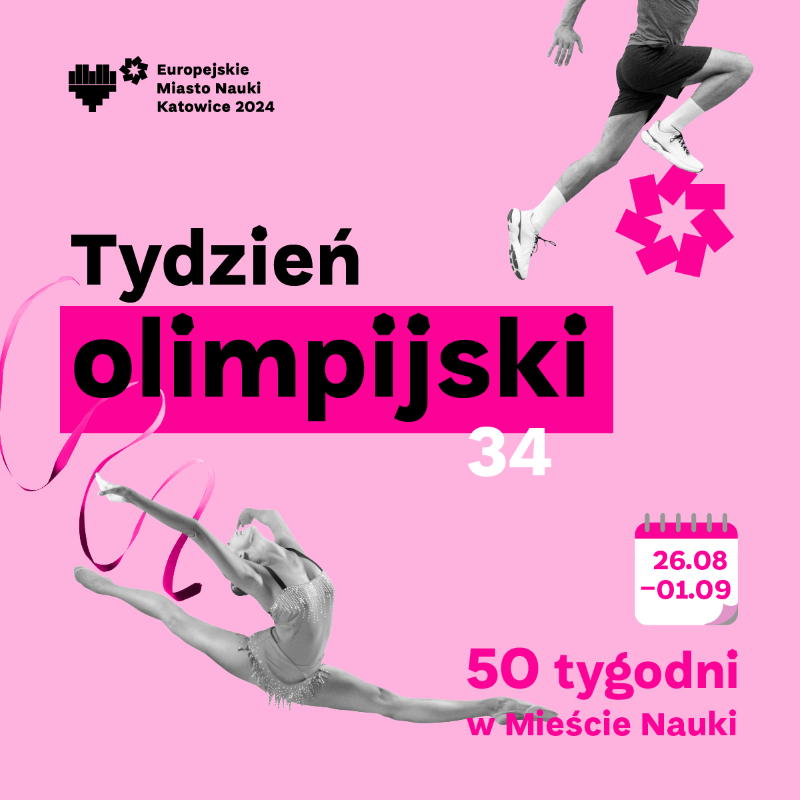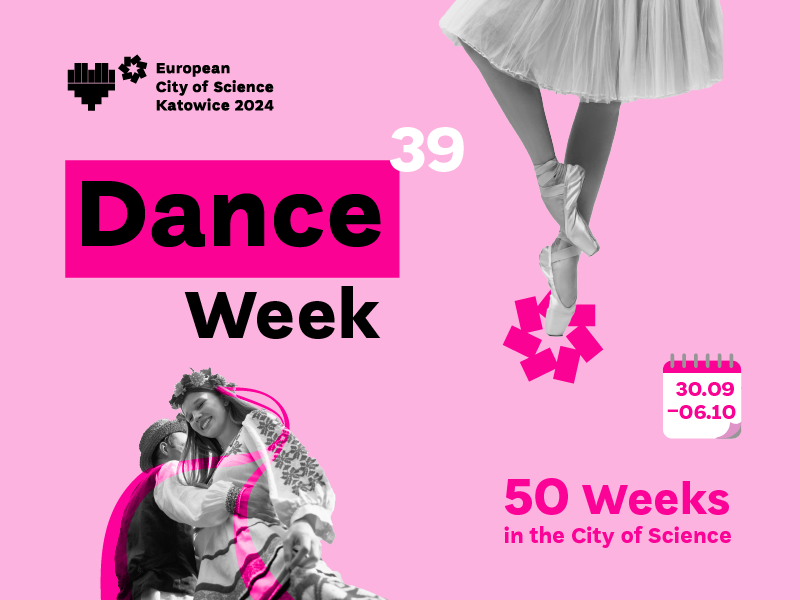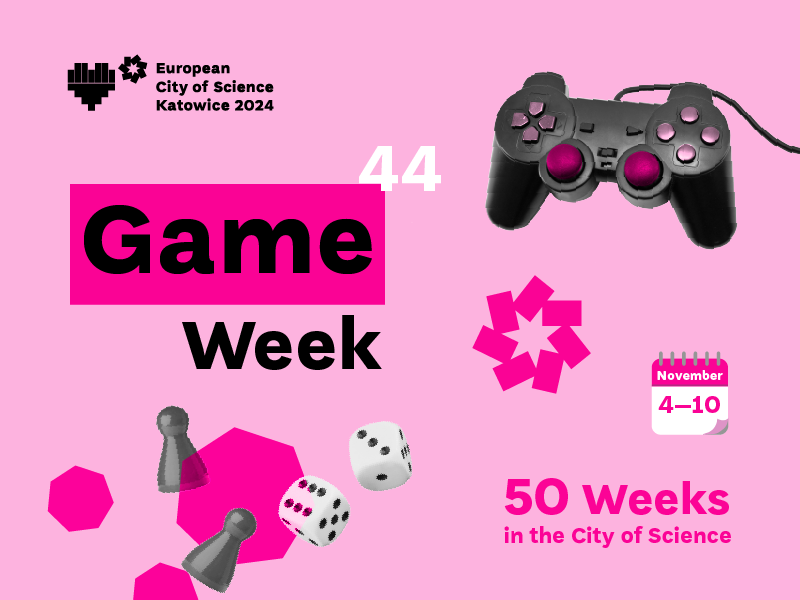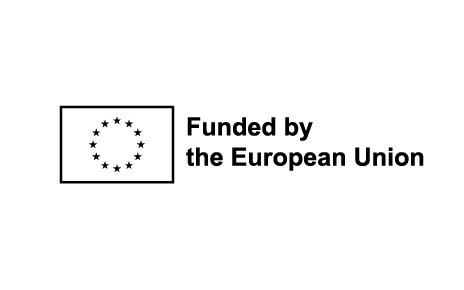50 Weeks in the City of Science is a programme stream, which will define the activity undertaken with regard to Katowice being awarded the title of City of Science 2024!
Each week was prepared as part of the Academic Consortium – Katowice City of Science cooperation. The representatives of the city of Katowice also included their programme proposals. The selection of the weeks’ themes, the combination of numerous motifs, and the coordination of the emerging offer have been supervised from the very beginning by Łukasz Lamża, PhD, Creative Director for 50 Weeks in the European City of Science.
What now? Feel free to take a look at the programme of the 50 Weeks in the City of Science! Some of them are still under construction – we will successively add up-to-date information. Have a look at each of the weeks, their curators, and the proposed activities and events.
However, we would like to remind you that there is still much work to be done. We are already inviting you to contact the ECSK 2024 office with your proposals for events, initiatives and activities that fit in with the theme of each given week. We look forward to the activities and initiatives that will soon have the chance to join the prepared offer. You can submit proposals by e-mail to emn@us.edu.pl (please indicate in the body of the email and in the subject line which week the proposal relates to). Please submit your proposals as soon as possible – we have adopted the general rule that the programme for each thematic week closes 8 weeks before it is due to start (except for the initial 8 weeks of 2024.
Cold Week: 1–7 January 2024
Curators: Aneta Szczygielska-Łaciak, PhD, Marcin Łaciak, PhD (The University of Silesia in Katowice)
Producer: Aneta Knapik (University of Silesia in Katowice)
Week number: 1
Week description
Event participants will have the opportunity to learn about the broad concept of cold and low temperatures which we deal with both in science and in everyday life. Topics ranging from medicine, biology, physics, geography, engineering, forensic science, and gastronomy, among others, will be covered. We will travel into space, and also move to the molecular, atomic, and even elementary particle scales to find out what are the temperatures there like. We will learn facts and myths about cold and its effects on the environment and living organisms. We will also find out how low of a temperature the human body can withstand. We will find the answers to the questions of what glaciers have to hide and what the traces preserved by low temperatures tell us. The warm atmosphere during the lectures, workshops, and demonstrations will not let anyone get cold, even if the temperature reaches absolute zero.
Offered events:
- Popular science lectures in various disciplines by eminent specialists from national and international scientific centres;
- Lectures with experiments for different age groups;
- Workshops for children, young people, and adults;
- Family workshops;
- Scientific debates;
- Meetings in the open air;
- Ice swimming;
- Photo/work exhibitions;
- Film screenings;
- Art shows.
Curators:
Aneta Szczygielska-Łaciak, PhD – Assistant Professor at the Faculty of Science and Technology of the University of Silesia. She has been involved in promoting physics and science for many years. Graduated in physics at the University of Silesia. After graduation, she started working at the Physics Didactics Laboratory at the University of Silesia where she organised many popular science events including competitions, teacher trainings, conferences, lectures and workshops for students at all levels of education. She enjoys teaching physics to children in a fun way. She has coordinated several national and European educational projects for students and teachers. Associated with the Silesian Science Festival KATOWICE for several years, she is the coordinator of the Exact Sciences Zone. In her free time, she enjoys skiing, hiking, and visiting fascinating places.
Marcin Łaciak, PhD – Assistant Professor at the Faculty of Science and Technology of the University of Silesia. He has been involved in promoting physics and science for many years. Graduated in physics at the University of Silesia. After graduation, he started working at the IMPiZŚ combining physics with medicine. Afterwards, he started working at the Physics Didactics Laboratory at the University of Silesia where he co-organised many popular science events including competitions, teacher trainings, conferences, lectures and workshops for students at all levels of education. He enjoys working with young people and children. He was a contractor of several Polish and European educational projects for students and teachers. He has been involved with the Silesian Science Festival KATOWICE for several years and is the coordinator of the Exact Sciences Zone. In his free time, he enjoys skiing and playing the guitar (if he has the time).
Treasure Week: 8–14 January 2024
Curators: Ewa Głuszek, MSc Eng., Prof. Eng. Małgorzata Labus (Silesian University of Technology)
Producer: Paulina Świtała (University of Silesia)
Week number: 2
Week description
The main theme is the treasures of the Earth. Not everyone realises that without mineral resources, most everyday items would not exist. During Treasure Week, we will learn about common rocks and minerals, as well as about the most valuable, unique treasures of the Earth, such as gold, diamonds, emeralds, and even extra-terrestrial rocks – meteorites. We will also present those without which modern technologies could not exist. We will show how rich and diverse the Earth’s treasures are, and we will also learn to tell them apart. We will have the opportunity to learn about the physical characteristics of minerals, including their fascinating fluorescence.
Earth’s Treasures is also an extraordinary world of fossilised animals and plants, documenting the history of the development of our planet – we will tell you about excavations and extraordinary searches. During Treasure Week, we will also present machines and devices that enable the exploitation of raw materials. We will also learn about robots that are revolutionising our industry and entering our everyday lives. At the end, there will be a Minerals and Fossils Exchange, where you will be able to see collector’s exhibitions and buy your own ‘treasure.’
What events can you expect?
- Workshops on identifying rocks and minerals
- Tour of the Museum of Mineral Deposit Geology
- Lectures and presentations on mineral fluorescence, meteorites, and fossilised animal remains, among other things.
- Show of mining machinery and industrial robots
- Minerals, rocks, and fossils fair
Curators
Ewa Głuszek, MSc Eng. – Head of the Czesław Poborski Museum of Deposit Geology at the Faculty of Mining, Safety Engineering and Industrial Automation of the Silesian University of Technology. In her work, she popularises knowledge about mineral resources and puts emphasis on raising awareness and education levels about the importance of mining in the national and international economy. She carries out her educational mission through numerous lectures, projects, workshops and thematic meetings with students and children.
Prof. Eng. Małgorzata Labus – works at the Faculty of Mining, Safety Engineering and Industrial Automation of the Silesian University of Technology. Her scientific interests focus on geochemical processes occurring in the rock environment and the application of thermal analysis in geological sciences. She is the supervisor of the Student Scientific Club of Geologists “Silesian”, within which she is the initiator of many popular science projects and events and actively participates in their organisation.
Drawing Week: 15–21 January 2024
Curators: Paulina Walczak–Hańderek, MA., Prof. Grzegorz Hańderek (Academy of Fine Arts and Design in Katowice)
Producers: Ewelina Budzińska–Góra (University of Silesia in Katowice)
Magdalena Palupska (Academy of Fine Arts and Design in Katowice)
Magdalena Foltyniak (Academy of Fine Arts and Design in Katowice)
Adrian Chorębała (Academy of Fine Arts and Design in Katowice)
Week number: 3
Week description
The process of drawing is like writing a diary: it’s a nice way of thinking about time passing.
(Rachel Whiteread)
Drawing Week will entertain you with numerous exhibitions, including the International Student Drawing Triennial, as well as activities in which participants will be involved. They will be able to take part in drawing workshops – one of them will concern a mural project carried out in Katowice.
Those interested in Drawing Week will learn what a ’drawing sculpture’ is, and have an opportunity to participate in a performance. Numerous lectures will cover topics related to, among others, contemporary drawing and the history of drawing.
Week description
Paulina Walczak–Hańderek, MA – graduate of the Academy of Fine Arts and Design in Katowice, majoring in painting (diploma with distinction in 2014). Currently an assistant in Prof. Kazimierz Cieślik’s Painting Studio and in Prof. Antoni Cygan’s Drawing Studio. Participant in many national and international exhibitions and projects. In her work, she mixes threads from the areas of art, literature, anthropology, architecture and sociology. Using various methods and activities, she addresses issues related to the forms of experiencing space at a multi–sensory level in personal, social and political dimensions. Recently, she has been fascinated by moments of break, pause, silence and all the necessary rifts in the architecture of our overstimulated lives.
Prof. Grzegorz Hańderek – graduate of the Academy of Fine Arts and Design in Katowice and the University of Silesia in Katowice. He is a professor of fine arts at the Academy of Fine Arts in Katowice, where he currently runs the Interpretation of Literature Studio. Since 2020, he has been the Rector of the Academy of Fine Arts and Design in Katowice. As a visual artist, he works in the field of drawing, graphics, installations and site-specific art. Author of several dozen solo exhibitions and participant in over 250 group exhibitions in Poland and abroad. Winner of many awards and distinctions.
Food Week: 22–28 January 2024
Curator: Katarzyna Brukało, DHSc (Medical University of Silesia);
Producer: Ilona Hajok, PhD (Medical University of Silesia)
Week number: 4
Week description
During Food Week, we will take a closer look at food and nutrition from various perspectives. We have to keep in mind that ingesting food is not only a fundamental biological need but also a matter of quality of life. This quality is impacted by the following dimensions of food:
- environmental – covering all stages ‘from the field to the kitchen’ including, among other things, issues of ecology, sustainable development, well-being of animals, food safety, good practices in food production, etc.;
- social – social relations take place also at the table and while eating.
- food/nutrition policy – shaping the food environment is within the purview of policymakers and decisions taken (e.g. sugar tax, food procurement regulations);
- economic – availability of food and the so-called ‘food deserts’ correlate with economic conditions.
- health – you are what you eat and what you put in your stomach!
These dimensions are linked together, therefore, making informed nutritional decisions taking into account these varied aspects is crucial.
Events offered:
- Scientific conference for teaching, medical, and peri-medical processionals – including how to work with a family having a child with an abnormal weight;
- Workshops for primary school students – food art + experiments on the plate + savoir vivre at the table;
- Workshops for secondary school students – ways to prevent wasting food, zero waste;
- Training for school nutritionists and directors of educational institutions – Public Food Procurement;
- I’m all green! – a joint workshop for pre-school children and carers (parents/grandparents) – setting up vegetable and herb gardens, planetary diet (herbs to take home);
- Healthy market – local food markets where local food producers present their products;
- Open-air cooking with a Chef;
- Advice for seniors – analyses of body composition with interpretation, workshops on household budgeting for seniors/excluded groups/food bank beneficiaries;
- Tasty game for the whole family – participants acquire knowledge on various aspects of food, such as production, health, culture, and ecology through participating in tasks and challenges.
Curator
Katarzyna Brukało, PhD, works in the Department of Health Policy at the Faculty of Public Health in Bytom of the Medical University of Silesia in Katowice. She is a dietician and specialist in public health, as well as a graduate of MBA studies in health care. Katarzyna Brukało is also an expert for the European Federation of the Associations of Dietitians (EFAD) and the Academy for Territorial Development in the Leibniz Association (ARL). She is a researcher and supervisor of many international projects taking place under the auspices of the Ministry of Health, the World Health Organisation, and the European Commission. While working as a public health expert for the Ministry of Health, she co-developed the Maps of Health Needs for heart failure. Her main scientific interests include: food policy, local health policy, and public food procurement.
Artificial Intelligence Week: 29 January–4 February 2024
Curator: Jan Kozak, PhD, DLitt, Assoc. Prof. (University of Economics in Katowice)
Producer: Barbara Probierz, PhD (University of Economics in Katowice)
Week number: 5
Week description
Thanks to algorithms artificial intelligence is able to analyse data, recognise patterns, make decisions, and even communicate in a similar way to humans. It is a fascinating research area, which opens doors to many new possibilities. Join us and discover how artificial intelligence shapes our world.
Artificial Intelligence Week will be rich in events allowing us to delve deep into this fascinating field. Thanks to lectures, workshops, and panels, you will learn what are its latest discoveries.
Events offered:
- Interactive conference on ethics in artificial intelligence and its influence on society.
- We venture into the world of machine perception and study the artificial intelligence’s ability to analyse paintings and recognise patterns – lectures;
- Language Labyrinths, or creative classes for children using natural language;
- Workshops for youth on robot design and programming;
- Open doors at the Institute of Innovative Technologies EMAG – laboratory tour;
- Cybersecurity for entrepreneurs and adults – lectures and workshops on cyber risk prevention.
Week curator
Jan Kozak, PhD, DSc, Assoc. Prof. – Head of the Machine Learning Department at the University of Economics in Katowice, leader of the research group Łukasiewicz – EMAG, and Director of the Cyber Science consortium, and primarily a renowned expert in artificial intelligence and machine learning. Actively participates in various academic and industry projects. He uses his passion to encourage young people to take up science, inspiring them to learn and explore the discipline.
Mountain Week: 5-11 February 2024
Curator: Prof. Zbigniew Waśkiewicz (Academy of Physical Education in Katowice)
Producer: Agnieszka Smykla, PhD, Joanna Śrubarczyk, and Oskar Kozikiewicz (Academy of Physical Education in Katowice)
Week number: 6
Week description
As befits the Academy of Physical Education in Katowice, the entire week will be full of sporting events, outdoor and scientific ones, whose main purpose will be to introduce each and every interested person into the world of mountains – those in the Silesian Beskids, as well as the Crown of the Himalayas!
The week will begin in the Rialto cinema and theatre with a screening of a film about a journey in the Himalayan Mountains Street children [Dzieci ulicy]. The film’s protagonists will tell us themselves about how the journey changed their lives.
An important element of every journey into the mountains is a safe trip back. This is why specialists will tell us all bout safety, the risks of avalanches, how to prepare for an amateur trip with family, and how to begin a professional adventure with mountain exploration, not only in Europe.
The scientific aspects of training and preparation for an expedition will be introduced. During the week, climbing workshops will be held on artificial walls, aimed at children and young people. There will be no shortage of photos, films, memories and stories from people who have climbed the highest peaks on Earth.
As part of Mountain Week, there will be a variety of shows, including a screening of the film ‘Z hałdy w Himalaje. Dorosłe życie’, as well as an exhibition of paintings, and a concert.
The participants will have the opportunity to listen to lectures on how mountains emerge. They will also consider what philosophy, psychology, and medicine have to say about mountains. Mountain Week will also feature a seminar dedicated to Jerzy Kukuczka – a Himalayan mountaineer from Katowice.
What events can we expect?
- Workshops on mountain safety, clothing and equipment selection
- Mountain trip with a guide
- Evening ski touring
- Climbing workshops for children and young people
- Scientific seminar on topics related to, among other things, alpine training
- Meetings and lectures with well-known alpinists
- Exhibition of photographs by Wojciech Kukuczka from Jerzy Kukuczka’s archives
- Film screenings with lectures
Curator
Prof. Zbigniew Waśkiewicz – associated with the Academy of Physical Education in Katowice. Has broad experience in the science of the physical culture and managing sports institutions.
Love Week: 12–18 February 2024
To be announced soon.
Humour Week: 19-25 February 2024
Curator: Łukasz Jach, PhD, Associate Professor (University of Silesia)
Producer: Małgorzata Balewska (University of Silesia)
Week number: 8
Week description
The ability to create and perceive humour is sometimes cited as one of the qualities that distinguish humans from other creatures inhabiting the Earth and shared laughter is one of the most important mechanisms for building social bonds. During ‘Humour Week’, we will try to show what science has to say about humour, laughter and smiling, and that humour itself is both a topic and a driver of interesting scientific research conducted from very different perspectives. Throughout ‘Humour Week’, we will be looking at both the psychology of humour and its different, cultural aspects. The week will be packed with events, such as lectures on the science of humour and humour in science, film screenings and meetings with people who work with humour on a daily basis. There will also be an opportunity to step into the role of a humour maker and test yourself in the craft of making others laugh.
What events can you expect?
-
- Funny science? Ig Nobel Prize and its winners. Introducing the famous prize, talking about its winners and meeting one of them.
- Humour in Polish – the classics of Polish comedy. Screening of a classic Polish comedy film combined with a talk on the film in question, the context in which it was made and its significance for Polish culture.
- Comedy on cue – the backstage of improvised humour.
Curator
Łukasz Jach, PhD, Associate Professor of the University of Silesia – psychologist and sociologist associated with the Institute of Psychology of the University of Silesia. He deals with evolutionary psychology, the psychology of humour, and the psychology of science. Author of many publications, including such popular science books as Od ucha do ucha. Homo sapiens się śmieje [From ear to ear. Homo sapiens laughs] and Wyobraź to sobie! Psychologiczna opowieść o bujaniu w obłokach [Imagine it! A psychological story about having one’s head in the clouds]. He loves jokes and enjoys telling them even more.
Three Cultures Week: 26 February–3 March 2024
Full name: THREE CULTURES WEEK. Muslim-Jewish-Christian Week
Curator: Aniela Kucharska, PhD (University of Silesia in Katowice)
Producer: Cecylia Tatoj, PhD (University of Silesia in Katowice)
Week number: 9
Week description
Even though today it may seem impossible, there was once a country in Europe in which three cultures and the three largest religions: Islam, Judaism, and Christianity coexisted together. Which country was it? It was Spain under the rule of Alfonso X whose approach to science, religion, and culture differed completely from the commonly adopted one at the time. This 13th-century Christian king was a supporter of religious tolerance and propagation of Jewish knowledge and Arabic scholars, while the capital of his country, Toledo, was one of the most important cities with regard to science in Europe. Today, we would like to come back to this state of affairs in Katowice – the European City of Science 2024. This is why we propose this extraordinary week – Three Cultures Week, during which you will be able to:
- tour the Centre of Culture and Dialogue ‘Doha’;
- get an original henna tattoo done;
- learn the basics of Arabic and Hebrew;
- taste the incredible Moroccan tee;
- enjoy a concert by an evangelical choir and a bandura performance;
- view interesting exhibitions, listen to fascinating lectures, and take part in thought-provoking debates.
We will show you that different cultures can not only co-exist but also intertwine and enrich each other. Three Cultures Week will prove that science and culture go well together and work towards a more peaceful world.
What events can you expect?
- Exhibitions for various audiences, including: ‘Renown Muslims. The bloom of Islamic thought’, ‘Churches in Arab countries’, ‘Cultural heritage of Morocco’;
- Learning Arabic and Hebrew;
- Lectures on the three cultures;
- Intercultural debate;
- Debate: ‘Three women. Three religions. The points of view?’;
- ‘Forgotten places’. In the footsteps of Jews;
- Weekend meeting with Islamic culture: Arabic coffee, henna tattoos, live Arabic music;
- Concert by an evangelical choir in an evangelical church.
Curator and producer
Aniela Kucharska, PhD, is a doctor of humanities specialising in linguistics. Assistant Professor of Romance Studies at the University of Silesia. Her scientific interests are centred around her passion – the history of Spain and South America. Co-organiser of the 5th International Hispanic Symposium ‘Encuentros’, as well as many workshops for Spanish language teachers. She organised a number of exhibitions promoting, among other things, Spanish-speaking countries. She is the coordinator for the annual event promoting the Spanish language in our region – ‘Hispanophone Day’ since 2019, as well as a coordinator for Erasmus+ since 2021.
Cecylia Tatoj, PhD, is a doctor of humanities specialising in linguistics. She has been working with the Spanish language at the University of Silesia since the beginning of her studies and throughout her career. Her research interests include similarities and differences between the Spanish and Polish languages and foreign language teaching with a special focus on the role of intercultural competence. She serves as a subject matter expert for Spanish language textbooks at the Ministry of Education and Science. She co-organised five international conferences and regularly conducts workshops for Spanish language teachers and lectures promoting the Spanish language. She has been a faculty coordinator for Erasmus+ for 20 years. In 2018-2022, she served as the Co-Chair of the Polish Association of Spanish Linguistics Experts.
Space Week: 4-10 March 2024
Curators: Milena Ratajczak, PhD, Jan Pomierny (New Space Foundation)
Producer: to be determined
Week number: 10
Week description
If you are interested in discovering the mysteries of the Universe, would like to learn about the backstage of space missions, take a look at Poland’s role in space and understand how satellites help monitor our planet and its changes – Space Week is perfect for you!
Get ready for a time full of cosmic events, during which every enthusiast of the night sky will find something for themselves. For the youngest, we have prepared a series of out-of-this-world workshops which will convince you that flying into space is no easy feat. Slightly older visitors will be able to engage in discussions with scientists, engineers, entrepreneurs and representatives of space agencies during panel meetings. Don’t miss Space Women’s Day and a demonstration of experiments that can be carried out by an astronaut on the International Space Station. There will also be inspiring lectures and night sky observations.
What events can you expect?
- Workshops for children on astronomy and astronautics;
- Space Women’s Day – it is they who create the Polish cosmos! Meet women who are involved in space research on a daily basis;
- Lectures on astronomy and space topics;
- Panel discussions on the role of space technology in everyday life;
- Presentation of selected experiment concepts for the International Space Station;
- Night sky observations.
Curators
Milena Ratajczak – PhD in astronomy, Assistant Professor of the Astronomical Observatory of the University of Warsaw. Her scientific interests focus on double stars and extrasolar planets. She promotes science as the coordinator of the UNAWE educational programme in Poland and a member of the board of the New Space Foundation and the Polish Astronomical Society. She cooperates with popular science magazines, edits books and games on astronomy. Co-founder of the creative studio Science Now specialising in science communication and the development of new ventures at the interface of science, education, art, and entertainment.
Jan Pomierny (New Space Foundation) – creative director and producer who has been developing projects at the intersection of science, education and culture for over 20 years. Founder of the strategic design studio Science Now and the New Space Foundation. He built his professional experience as the founder of one of the largest thematic portals on the Polish Internet (Astronomia.pl), then as a journalist, publisher, creative producer, and director. One of the originators of the SPLOT Institute. Member of the Royal Astronomical Society. Initiator and producer of the sci-fi film Ambition, depicting the European Space Agency’s Rosetta mission. One of the creators of the Polish Pavilion at the World Exhibition EXPO 2020 in Dubai. Ambassador of the Silesian Science Festival KATOWICE since 2021.
Numbers Week: 11-17 March 2024
Curator: Anna Glenszczyk, PhD (University of Silesia)
Producer: Paulina Świtała (University of Silesia)
Week number: 11
Week description
Numbers have accompanied mankind for thousands of years, and even those who had the biggest problems with mathematics at school cannot escape from them in everyday life. The aim of the week is to show the ubiquity and usefulness of numbers, i.e. to communicate exact sciences by pointing out the areas of everyday life in which mathematics, physics, chemistry and computer science are used. During the week’s events, research and issues currently being investigated by scientists working at the Faculty of Science and Technology of the University of Silesia will be presented.
Younger participants can take part in activities that allow them to enjoy the use of exact sciences, such as simple math competitions, an IT field mini-game, building Lego robots with elements of programming, and chemical shows.
High school students will be able to learn more advanced issues regarding the use of databases or the use of 3D printing in aviation and astronautics.
Activities prepared with adults and older people in mind include computer image processing classes and lectures on financial issues.
Proposal of selected events:
- Robotics workshops using Lego – IT workshops for groups of a dozen or so people, during which participants build robots and they are introduced to elements of programming motion and light sensors.
- Statistics workshops – IT workshops presenting statistical issues for various age groups.
- Logic puzzles – continuous workshops organised throughout the day as part of Pi Day, addressed to children and school youth.
- A stroke of luck or how much? Old Polish measures – counting exercises workshops.
- Is the roll of the dice really random and why is PI approximately 3.14?
- Computer workshops aimed at high school students exploring combinatorial issues and numerical methods using the basics of the Python language.
- Magic Chemistry – chemical workshops addressed to various age groups in groups of ten, workshop duration approx. 45 minutes, eight workshops are planned to be held over two days.
- Evolutionary art – computer image generation – computer workshops for high school students and adults explaining the mechanism of using artificial intelligence to create images.
- Effective communication with a database – how to use a base without writing questions – advanced computer workshops aimed at students of computer technical secondary schools introducing the issues of objective-relative mapping with the use of the Medoo library.
- Reach where the eye cannot reach with an X-ray scanner – biomedical engineering workshops explaining what X-ray examination is, including: by scanning a “Kinder Surprise egg” with a tomograph; workshops for grades 7 and 8 of primary school and high school students, conducted in groups of 15 people.
- 3D printing technologies in aviation and astronautics – 3D printing workshops for grades 7 and 8 of primary schools and high school students, participants will be able to use a 3D printer and receive created prints.
- What will the light tell us about a medicine? Workshops using uv-vis spectroscopy, during which, among others: it will be examined how factors such as light or temperature affect the chemical structure of a medicine, workshops for grades 7 and 8 of primary schools and high school students conducted in micro groups of 6 people.
- Chemistry shows – continuous chemistry shows lasting all day during Pi Day, including: using liquid nitrogen.
- Mathematical match – team competition for secondary school students.
- Pilionerzy (Who Wants to Be a Pilionaire?) – a series of competitions for students inspired by a popular television format.
- Chemistry competition for students of different age groups.
- In search of philosopher’s stone – an IT mini field game with RPG elements for primary school students organised in the building of the Silesian Centre for Education and Interdisciplinary Research in Chorzów.
- 100π run – a sports event for everyone interested in a healthy lifestyle over a mathematical distance of one hundred times Pi (cooperation with USil University Sports Association)
- Prof. T. Kowalska Chemistry Scientific Conference
Curator
Anna Glenszczyk, PhD – Mathematics graduate, Assistant Professor at the Faculty of Science and Technology, logician. University lecturer with several years of experience dealing with the foundations of mathematics and logic in mathematics, computer science and philosophy. Co-organiser of the conference Zastosowania Logiki w Filozofii i Podstawach Matematyki (Applications of Logic in Philosophy and Foundations of Mathematics). Co-organiser of the Pi Day – an event communicating exact sciences that has been held annually for several years at the Faculty of Science and Technology of the University of Silesia. Privately, an English literature enjoyer.
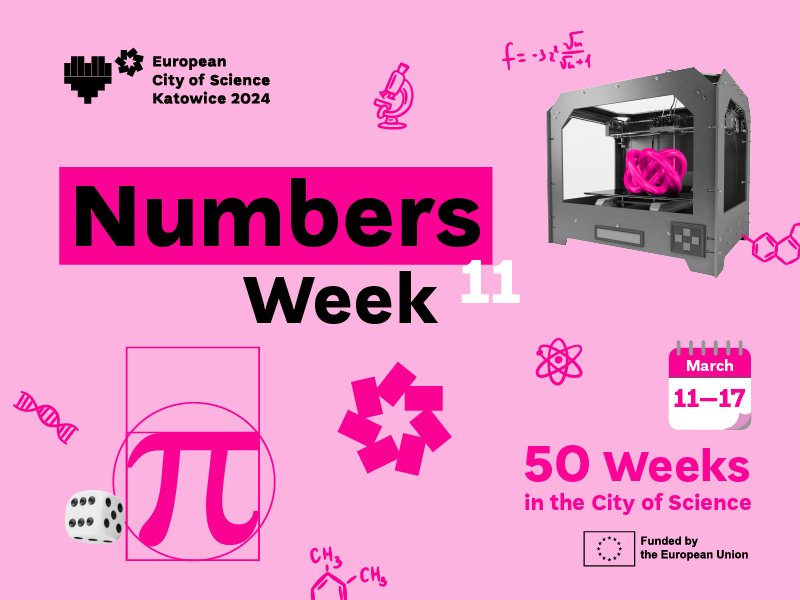
City Week: 18–24 March 2024
Curator: Roman Marchaj, PhD (University of Silesia in Katowice)
Producer: Ewelina Budzińska-Góra (University of Silesia in Katowice)
Week number: 12
Week description
The name alone – European City of Science – pushes us toward the topic of the city and to ask some important questions. First and foremost, those fundamental questions, such as: who is the city for? What is the city for? What should it be like?
The idea of City Week was born out of a deep conviction that the city is a thing we share collectively and it must be a subject of debate involving everyone who uses it – regardless of age and education level. Each perspective is important. This is why we would like to include representatives of various scientific communities, artists, intellectuals, local government officials, social activists, and most importantly the residents in the urban discourse.
Under public law, there is no other concept as catch-all as ‘resident’. It is an individual who lives within an area of a local government unit with the intention of permanent residence. Consequently, age, citizenship, legal capacity, and the fact of being incapacitated are irrelevant to the acquisition of this status. We keep this fundamental idea of a local government in mind and make sure to prepare City Week without unnecessary limiting factors. We invite all people interested in discussing the city and various aspects of its operation to participate.
Events offered:
- Scientific conference ‘The future of Polish metropolises’;
- A city for children and young people – workshops for children, young people, and adults;
- Interdisciplinary workshops for students;
- Scientific debates.
Curator
Roman Marchaj, PhD – Assistant Professor at the Faculty of Law and Administration of the University of Silesia in Katowice; member of the Local Government Law Team. Author of many publications in the field of administrative law and local government. In his academic work, he focuses primarily on the system of the metropolitan association in the Silesian Voivodeship and direct democracy, i.e. the influence of residents on the process of making the most important public decisions. Roman Marchaj, PhD, is also a legal counsel for local government units and other public sector entities, including public universities.
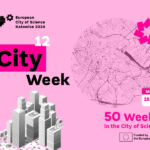
Sound Week: 1–7 April or 2-8 April 2024
Curator: Sara Knapik-Szweda, PhD (University of Silesia in Katowice)
Producer: Paulina Świtała (University of Silesia in Katowice)
Week number: 13
Week description
Sound Week will be the time of many interesting workshops and lectures for a broad audience. It serves as a great offer for all those who would like to take a closer look at the issue of sound from many perspectives and find its meaning in various spheres of life. Together, we will delve into the world of science and research – we will find out how sound influences our psychophysical well-being and the functioning of our brains.
We will discuss its physical properties and attempt to answer the question of whether sound can contribute to the development of social, communicational, and emotional spheres. We will become creators of sounds and creators of musical pieces developed from the recorded sounds of the city, culminating in a joint concert. We will become musicians who explore sound, words, and voice together in the centre of Katowice. With a workshop entitled ‘Sound self care’, we will consider whether sound can stimulate us and whether it can relax us. Sound will become a form of integration between many various communities and minority groups. It will become an opportunity to connect it with paintings, movements, and numbers.
Events offered:
- Recording the sounds of the Metropolis (Tuesday and Wednesday) – workshops for children and adults conducted by Przemysław Schaller (Karol Szymanowski Academy of Music in Katowice), as part of which the participants will record particular sounds in Katowice and surrounding areas. The recorded sounds will be used to produce a joint improvisation/concert and visualisations (pictures/photos in cooperation with Paweł Mędrek, PhD, DLitt, from the Academy of Fine Arts and Design in Katowice);
- Exploring sounds in the community (Wednesday) – music therapy workshops at the Katowice’s market square and urban concert with passers-by. A time to explore sounds, words, and voice (Tuesday) (Nordoff Robbins Foundation);
- The way of sound – one-day conference including two plenary sessions, a discussion panel, and two workshops (Thursday) (event for scientists, doctoral students, students, musicians, enthusiasts, deaf people);
- Exploring sounds in space (Friday) – workshop on exploring sounds for various age groups and people at risk of exclusion (NOSPR/AM). Workshop in the special workshops room conducted by music therapists (children with developmental challenges, adults with disabilities, people with mental disorders);
- Does sound help you relax – workshops ‘Sound self care’ and ‘Sound self care in motion’ (Monday);
- Experiments day (Saturday) – workshops ‘Physics and Acoustics for children’ and ‘Physics and Acoustics for adults’;
- Improvised concert with recordings from Tuesday’s sound walk (Sunday).
Curator
Sara Knapik-Szweda, PhD – Assistant Professor at the Faculty of Social Sciences of the University of Silesia in Katowice. Certified music therapist (MT-C), supervisor, tutor, teacher. Founder of MuzKi – a place carrying out professional music therapy for various groups. She works clinically as a music therapist with a variety of participants in terms of age and developmental challenges. Her research interests are related to long-term music therapy for people on the autism spectrum, Family-Centred Music Therapy for premature children and their families, and empowerment for families.
Virus Week: 8–14 April 2024
Curator: Karolina Lau, DPharm, MD (Medical University of Silesia);
Producer: Ilona Hajok, PhD (Medical University of Silesia)
Week number: 14
Week description
Virus week is a time to fight the problem of flagrant virus disinformation known as the so-called infodemic. In the face of the frequent dissemination of fake news, which travels with light speed, and the increasing influence of anti-vaccination movements, taking proper action with regard to health education is becoming more and more crucial. Our goal is to promote prophylaxis and raise awareness of the importance of a healthy lifestyle. Starting with proper nutrition, through stress control, to vaccinations – we want to show how important are those things for our health. At Virus Week, there will be many fascinating lectures, and the participants will have the opportunity to learn a great deal about the secrets of microbiology and take part in vaccination promotional activities. However, we shouldn’t forget to have fun! Our goal is to reach as many people as possible and provide them with important information in an attractive way.
Through various activities and social media, we will promote the slogan ‘GOLDEN 7 – HOW SHOULD WE LIVE TO NOT FALL PREY TO VIRUSES?’.
- RULE #1: GET VACCINATED!
- RULE #2: EAT HEATHY!
- RULE #3: BE HYGENIC!
- RULE #4: DO NOT SMOKE!
- RULE #5: LIMIT STRESS!
- RULE #6: BE ACTIVE!
- RULE #7: SIGN UP FOR REGULAR CHECK-UPS!
Virus Week is a great opportunity to understand how we can protect ourselves and others from viruses and how to approach the topic of health in a responsible and conscious way.
What events can you expect?
- Scientific conference.
- Field game/health path – viruses vs vaccines.
- Young scientists’ forum, inter-university conference entitled ‘Viruses in our lives’ in cooperation with Student Science Association and IFMSA.
- Virtual run under the slogan ‘Golden 7 – how should we live to not fall prey to viruses?’.
Curator
Karolina Lau, DPharm, MD – Assistant Professor at the Chair and Department of Medicine and Epidemiology at the Faculty of Medical Sciences in Zabrze of the Medical University of Silesia in Katowice. She is also the supervisor of a student research group, passionate about teaching and developing students’ scientific aptitude. Moreover, she was the coordinator for a COVID-19 vaccination campaign among young people under the slogan #SUMsięSZCZEPI. As a lecturer and speaker, she participated in many prestigious scientific events, such as the 4th Health Challenges Congress where she took part in a session dedicated to the topic of stress. In addition, she is involved in the organisation of the Interdisciplinary Conferences as part of the series ‘W przestrzeni stresu i lęku’ [In the area of stress and anxiety]. She is also a co-author of many interdisciplinary monographs and scientific works contributing to the development of scientific knowledge.
New Technologies Week: 15–21 April 2024
Curator: Katarzyna Schmidt, PhD, Associate Professor of the University of Silesia
Producer: Paulina Świtała (University of Silesia)
Week number: 15
Week description
Katowice, Chorzów, and Sosnowiec will become an innovation centre during New Technologies Week. For seven days, science will reach new heights through the exploration of such fields as physics, chemistry, mathematics, computer science, biomedical engineering, and materials engineering.
An exhibition wholly dedicated to CERN entitled ‘Accelerating Science’ will be on display in the SMCEBI building in Chorzów. It will transport event participants into the fascinating world of particle physics. The exhibition features three capsules with a theoretical physics office and a place for children, among other things. Interactive stands, experiment demonstrations, and meetings with scientists will make it possible to deepen one’s knowledge on the new discoveries in physics and open doors to the mysterious world of microcosmos.
Workshops, run by renowned specialists during New Technologies Week, will provide an opportunity to delve deep into new technologies. From artificial intelligence to nanotechnologies, each of the participants will find something of interest to them, something that will awaken their curiosity, and broaden their horizons.
Lectures will be an important part of New Technologies Week. Experts from a wide variety of fields will share their perspectives on the developing fields of science, grabbing their attention and giving them a little push to think outside well-traveled roads. Discoveries in particle physics, artificial intelligence, or new materials will be presented in such a way as to spark the interest of laymen.
Expert debates are another programme item, which will highlight the many meanings of the week’s theme. They will discuss ethical and social aspects of technological development in nanotechnologies all the while attempting to find the balance between development and responsibility. Insightful discussions will allow us to take a look at technology from many different perspectives and bear in mind their advantages and possible challenges.
A special edition of the TEDx conference centred around topics related to the use of new technologies in research done by young scientists will also be of interest to participants.
Many meanings of the week’s topics will become a source of inspiration for all those who will take part in this unique event. I won’t be only a week of scientific discoveries but also a great opportunity to reflect on the influence that new technologies have on our everyday lives, society, and the future of our planet. New Technologies Week in Katowice is a meeting with the future, which encourages a joint venture into the unknown with the aim of creating a better tomorrow.
Organ Week: 22–28 April 2024
Curator: Ludwika Konieczna-Nowak, PhD, DLitt, Associate Professor of the Karol Szymanowski Academy of Music in Katowice (Karol Szymanowski Academy of Music in Katowice)
Producer: Aleksandra Kwiatkowska (University of Silesia in Katowice)
Week number: 17
Week description
What is your first thought when hearing the word ‘organs’? Do you imagine a majestic musical instrument, or rather a heart, lung, or other internal organ? Organ Week will cover all of those associations. Organ Week will feature concerts and workshops inaugurating the new organs built in the concert hall of the Academy of Music. Prof. Władysław Szymański – Rector of the Academy of Music – will be one of the performers. A renowned French organ player Olivier Latry will also be our guest. We will listen to the sound of organs in various places and in different forms. In addition, there will be lectures and presentations on health. Perhaps, for some you you the first thing to spring to mind was administrative organs? This is also an interesting topic, which we undoubtedly will touch upon.
We will also invite you to visit the academic Organ Museum, and for children, we will prepare workshops using… mouth organs and concerts with a repertoire that is certain to be interesting to them.
Events offered:
- inauguration of the new organ – concerts of the Academic Symphony Orchestra, recitals, workshops, with the participation of Władysław Szymański, Rector of the Karol Szymanowski Academy of Music, and French virtuoso Olivier Latry;
- tour of the Organ Museum;
- concerts, workshops, and meetings for children, adults, and seniors;
- lectures, discussions, and presentations on prophylaxis and health, as well as sociology.
Curator
Ludwika Konieczna-Nowak, PhD, DLitt, Assoc. Prof. of the Karol Szymanowski Academy of Music – she finished her Master’s degree studies in Music Theory at the Katowice’s Academy of Music. She continued her education at the Academy of Music in Wrocław and the School of Music, University of Louisville, gaining competencies in music therapy. Currently, she is the head of the Music Therapy Department at her alma mater. Her main research interest is music therapy for people with trauma, particularly children and young people. She is also fascinated by the links between aesthetic thought and various aspects of music therapy.
Architecture Week: 29 April–5 May 2024
To be announced soon.
Book Week: 6–12 May 2024
To be announced soon.
Breath Week: 13–19 May 2024
Curator: Ludwika Konieczna-Nowak, PhD, DLitt, Associate Professor of the Karol Szymanowski Academy of Music in Katowice (Karol Szymanowski Academy of Music in Katowice)
Producer: Agnieszka Sepioło (Karol Szymanowski Academy of Music in Katowice)
Week number: 19
Week description
What is breathing? It is an essential process, which we can think about from many perspectives: physiological, psychological, or artistic. We sometimes say: ‘I need a breather’, when we feel like taking a rest. As part of Breath Week, we will take a look at breathing from various points of view.
There will be scientific conferences dedicated to education and music therapy, during which we will reflect on breathing while moving and dancing. We will also learn about the results of research on music therapy for people with various diseases and disorders. We will find out how breathing and breathing exercises can help us reach a better quality of life. We will also enjoy concerts featuring a brass band and other ensembles, as well as lectures of a medical nature.
Events offered:
- International Conference ‘Breath, Music and Music Therapy’;
- concerts by the Academic Brass Band;
- concerts, workshops, and meetings for children, adults, and seniors;
- lectures, discussions, and presentations on prophylaxis and health.
Curator
Ludwika Konieczna-Nowak, PhD, DLitt, Assoc. Prof. of the Karol Szymanowski Academy of Music specialising in music theory. She continued her education at the Academy of Music in Wrocław and the School of Music, University of Louisville, gaining competencies in music therapy. Currently, she is the head of the Music Therapy Department at her alma mater.
Her main research interest is music therapy for people with trauma, particularly children and young people. She is also fascinated by the links between aesthetic thought and various aspects of music therapy.
Money Week 20–26 May 2024
Curator: Łukasz Szewczyk, PhD (University of Economics in Katowice)
Producer: Joanna Muller (University of Silesia in Katowice)
Week number: 20
Week description
Money has always been an object of interest for the finance sector and finance experts. However, it is not only an economic category but also a subject of interest for other fields of science, such as psychology, as it is often associated with various emotions. Money is a symbol of wealth and prestige, for some people a guarantee of security, for others a symbol of evil and perdition. It is worth talking about money, especially in view of the fact that it is still a taboo subject in our culture. We should not forget that money is used by almost everyone and that there are practically no age limits to it.
The idea of Money Week is to present the different forms and dimensions of money and to show how important it is in everyone’s life. The aim of the events organised is to reach the widest possible audience, including children and young people, adults and seniors, as well as the academic community, especially those among its representatives who do not deal with money in their teaching and research.
Events offered:
- an academic seminar on payment innovation/FinTech/BigTech in the financial sector, with practitioners and public administrations;
- workshops for primary/secondary school students on money/payment instruments/financial management. Workshops can take gamification form;
- a lecture/workshop for senior citizens under the working title: ‘Using financial services does not have to be difficult’;
- an exhibition with the working title ‘Money yesterday and today’ combined with a lecture on the history and evolution of money.
Curator
Łukasz Szewczyk, PhD – Assistant Professor at the Department of Banking and Financial Markets at the Faculty of Finance of the University of Economics in Katowice. His research interests focus on the functioning of the financial system, in particular in terms of its broadly understood stability. For years, he has been involved in science communication, e.g. as part of educational programmes addressed to various groups of recipients. He is a lecturer at the Economic Children’s University, an initiative implemented by the University of Economics in Katowice together with the Foundation for the Promotion and Accreditation of Economic Education. He is also involved in the ‘Economics for Secondary Schools’ initiative, which is an original programme of the University of Economics in Katowice. Member of the Programme Council of the University of Economics of the Third Age.
Flying Week: 27 May–2 June 2024
To be announced soon.
Old Age Week: 3–9 June 2024
To be announced soon.
Crystal Week: 10–16 June 2024
Curator: Magdalena Szubka, PhD (University of Silesia in Katowice)
Producer: Agnieszka Jankowska, MA (University of Silesia in Katowice)
Week number: 24
Week description
We invite you to discover how fascinating the world of crystals is and what their unique properties are during Crystal Week. It will also be an excellent opportunity to learn more about their use. Due to their diversity and uniqueness, crystals are used in many aspects of everyday life as well as in advanced technologies. Not everyone is aware that we are surrounded by a multitude of substances, materials and objects that have a crystal structure on a daily basis. The diamonds we are all familiar with are crystals of pure carbon, but crystals are also, for example, salt or sugar. Crystallography, electronics, optoelectronics, jewellery, chemistry, biology, pharmacy, and medicine are a few fields in which crystals play an important role.
What events can you expect?
- The week will feature lectures by eminent specialists from national and international research centres;
- Exhibitions and workshops for students;
- Polish National Crystal Growth Competition;
- Field games to generate interest in the exciting and beautiful world of crystals.
Curator
Magdalena Szubka, PhD – an academic, physicist, and Assistant Professor at the Institute of Physics, Faculty of Science and Technology of the University of Silesia. She conducts scientific research on the electron structure and microstructure of advanced materials used in photonics and modern technologies. Science communicator, member of the Scientific College of the Children’s University of Silesia, and author of lectures and workshops for children, young people, and schools.
Transport of the Future Week: 17–23 June 2024
To be announced soon.
Silesia Week: 24–30 June 2024
To be announced soon.
Knowledge Week: 01–07 July 2024
To be announced soon.
Contrast Week: 8–14 July 2024
To be announced soon.
Microworld Week: 15–21 July 2024
To be announced soon.
Voice Week: 22–28 July 2024
To be announced soon.
Music Week: 29 July–4 August 2024
To be announced soon.
Boredom Week: 5–11 August 2024
To be announced soon.
Culture and Tradition Week: 12–18 August 2024
To be announced soon.
Eco Week: 19-25 August 2024
Curator: Magdalena Bogacka, PhD Eng. (Silesian University of Technology)
Producer: Weronika Cygan (University of Silesia in Katowice)
Week number: 33
Week description
Eco Week is a time when we open the door to the fascinating world of ecology and sustainable development. The programme includes extraordinary workshops and popular science lectures that show the diversity and multi-aspect nature of ecological issues in virtually every discipline of life.
During these days, we will focus on issues related to environmental protection, taking a closer look at recycling and upcycling processes. We will learn what innovative methods allow us to transform waste into modern products, in line with the idea of a circular economy.
However, not only adults will find something for themselves – we have prepared special workshops for the youngest participants, during which they will creatively and interactively learn the secrets of ecology and discover how to make valuable things from waste. On the other hand, we will let adults see how a seemingly ordinary aluminium can become not only an element of everyday use but also an object of sports rivalry. Sports canmagedon, i.e. an obstacle course, will attract adult participants, teaching them that ecology can be fascinating and that we can experience the can recycling process firsthand.
Eco Week is not only about transmitting knowledge but also inspiring people to take action for our planet. This is a time when everyone can discover that ecology is not only an obligation but also an exciting journey through the world of innovation and opportunities that a sustainable lifestyle brings.
Events offered:
- ‘Hasiomaszkietnik’ workshops – laboratory workshops for two different age groups – school children and students/adults.
- Workshops cover the following topics: Chemistry from our kitchen, whether “bio” products are eco-friendly, microbiology of waste, composting of by-products in our kitchen.
- Lectures on current waste management, bio-products and their impact on the environment, which changes the world into a more circular one.
- Ecological workshops, where participants will explore various aspects of a sustainable lifestyle. During these workshops, participants will have the opportunity to:
- transform waste materials into unique designer products.
- create cosmetics, cleaning products and soaps from natural ingredients.
- learn how to reduce waste in the kitchen and use leftover materials to create practical vegetable packaging.
Curator
Magdalena Bogacka, PhD Eng. – she completed her doctoral studies at the Silesian University of Technology, Faculty of Environmental Engineering and Energy, where in 2018 she obtained a PhD in technical sciences, specialising in waste management. In her work, she deals with topics related to environmental analyses, carbon footprint, circular economy and broadly understood waste management. Winner of the Rector’s Distinctions and numerous competitions, including an international competition organised by WHO and Marka Śląskie (Silesian Brand), related to the invention of the “decontamination gate”. Since 2012, the main organiser of the international conference for young scientists, Environmental Protection and Energy, which brings together almost 400 people, allowing young scientists to present their first research results in a friendly atmosphere. She is accredited in PRINCE2 and AgilePM project management.
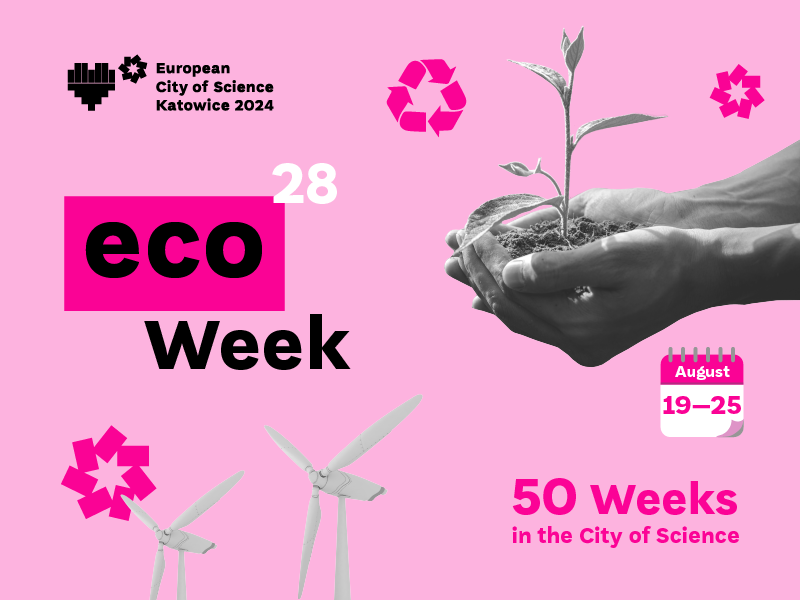
Olympics Week: 26 August – 1 September 2024
Curator: Kajetan Słomka, PhD, Associate Professor of the Academy of Physical Education in Katowice (Academy of Physical Education in Katowice)
Producer: to be determined
Week number: 35
Week description
Olympics Week – the boundaries between sport and science are becoming increasingly blurred. What is the Olympic spirit? It is not only the determination and passion of athletes but also decades of scientific research to reach the heights of human performance.
The residents of Katowice and the region will have the chance to delve into the secrets of sports psychology, understand the mechanisms behind human body movement, and learn about the history of the Olympic Games, which are a symbol not only of sporting rivalry but also of team spirit and universal values.
How is technology influencing the development of sport? How can modern training methods, based on data analysis, help an athlete perform better? How does hosting such a large event as the Olympic Games affect the development of host cities, their infrastructure and social life?
During Olympics Week, we will try to answer these and many other questions by combining different scientific fields into one big interdisciplinary experience.
Events offered:
- Lecture on the history and tradition of the Olympic Games,
- Practical workshops at the facilities of the Academy of Physical Education and the city,
- Debate on the future of the Olympic Games,
- Presentation of films about the Olympic Games,
- Olympic Games knowledge competition,
- Exhibition about the Olympic Games and their history,
- Mini Games for the youngest children and their parents and grandparents at the Academy of Physical Education Katowice or the Silesian Stadium.
Curator
Kajetan Słomka, PhD, Associate Professor of the Academy of Physical Education in Katowice – Deputy Head of the Department of Human Motor Skills at the Academy of Physical Education in Katowice. He is also the Head of the Kinesiology Laboratory at the Institute of Sport Sciences of the Academy of Physical Education in Katowice, where he researches: motor coordination focused on the analysis of kinetics and kinematics of movement, posture control, and the impact of balance training in virtual reality.
Prof. K. Słomka is also a Plenipotentiary of the Rector of the Academy of Physical Education for the Student Scientific Movement at the Academy of Physical Education in Katowice. He has comprehensive professional experience in sports science and physical education, with a particular focus on motor behaviour, kinesiology, and sports performance.
Cancer Week: 2–8 September 2024
To be announced soon.
Katowice Week: 9–15 September 2024
To be announced soon.
Luck Week: 16–22 September 2024
To be announced soon.
Tourism Week: 23 - 29 September 2024
Curator: Paweł Piotrowski, PhD (University of Economics in Katowice)
Producer: to be determined
Week number: 38
Week description
Today, tourism is an extremely important economic, social and spatial phenomenon. The changes taking place in the world, which it often contributes to, mean that it faces many challenges. These include challenges related to climate change, urban gentrification, the overtourism phenomenon, the Instagramisation of culture and the development of new, often controversial forms of it, such as dark tourism. During Tourism Week, participants will consider the possibilities of making tourism more resistant to changes taking place in the environment, they will learn how tourism changes and influences our socio-economic life, and also about its new forms by participating in walks, workshops and panel discussions. All this to become a more conscious tourist, travelling not always far from one’s own home.
Events offered:
- Resilience of tourism to crises – scientific debate on the possibility of boosting the resistance of modern tourism to increasingly dynamic changes in the environment;
- The future of tourism in the Silesian Voivodeship – the importance of tourism for the Silesian Voivodeship and the development of the tourist offer due to the growing role of artificial intelligence, the increasing importance of seniors, people with special needs and digital nomads in tourism;
- Social responsibility of influencers – open panel discussion devoted to the influence of social media on the behaviour of modern tourists;
- New forms of tourism – visiting non-obvious local attractions – e.g. housing estates, water towers, spoil heaps using new forms of city discovery such as urbex or flanering;
- Get to know your city – a series of walks around selected cities (including Katowice, Gliwice, and Sosnowiec) with the authors of books devoted to these cities and published in recent years.
Curator
Paweł Piotrowski, PhD – an employee of the Department of Management Theory at the University of Economics in Katowice, manager of the Tourism Economy degree programme at this University and supervisor of the KoNTiki Tourism Student Research Group. Author and co-author of several dozen publications in Polish and English on management issues in tourism and territorial marketing, with particular emphasis on issues related to the management of special events, industrial heritage tourism and sustainable tourism development. He has cooperated many times with economic practice – the Marshal’s Office of the Silesian Voivodeship, the Silesian Tourist Organisation and the Coal Mining Museum in Zabrze. He also works as a tour guide. Privately, he is interested in 20th-century architecture and the history of Central Europe.
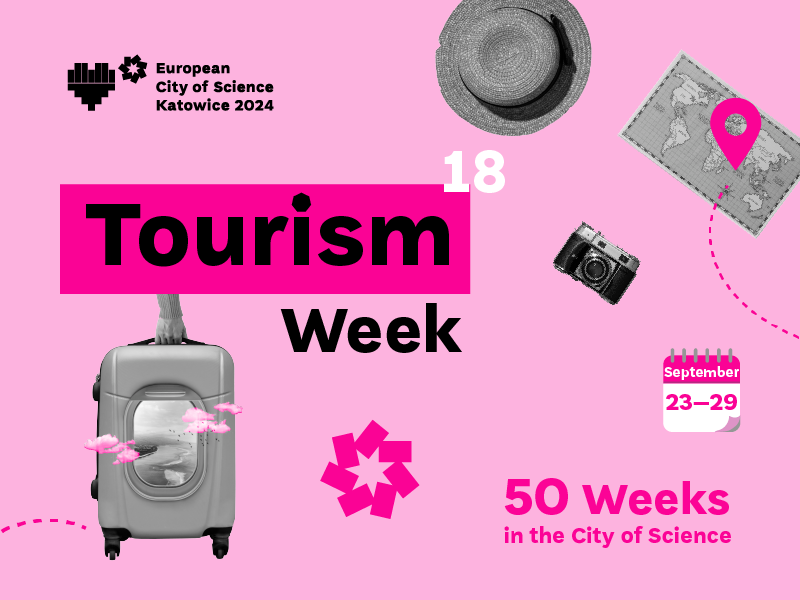
Dance Week: 30 September – 6 October 2024
Curator: Artur Fredyk, PhD (Academy of Physical Education in Katowice)
Producer: Aleksandra Kwiatkowska (University of Silesia in Katowice)
Week number: 40
Week description
Dance is a very broad phenomenon concerning not only movement sensu stricto, but also all the currents of which it is composed and the fields it combines to create something unique. The idea behind Dance Week is to present a wide range of dance techniques during stage shows, to conduct workshops showing the methodology and didactics of dance, and finally to show the elements of dance in sport, and finally to show the links between the art of dance and the 10th muse.
Events offered:
- Amateur Ballroom Dance Tournament for all (or a tournament in another dance technique) for the AWF Rector’s Cup/Award. Duration: 2 days Day I – qualifying. Day II – finals + show;
- Theatrical performance: Dance Gala prepared by the Ballet School in Bytom;
- Folk dance workshops – ‘Folklore is not lame’ conducted by dancers-choreographers and dance educators of the Stanisław Hadyna Song and Dance Ensemble ‘Śląsk’;
- Workshop: DANCING IN FITNESS – conducted by educators and students of the AWF Katowice;
- Screening of films on the subject of dance, preceded by a lecture prepared by the students of the Academy of Physical Education in Katowice specialising in dance and artistic forms of physical activity. The event will take place at the Kosmos Cinema in Katowice;
- Workshop: DANCE IS SPORT – conducted by educators and students of AWF Katowice.
Curator
Artur Fredyk, PhD – doctor of physical education in the field of anthropomotorics at the Academy of Physical Education in Katowice. Graduate of the Chopin University of Music in Warsaw (MA in ballet pedagogy) and the Ballet School in Bytom (classical dancer). Instructor of the sports discipline Sport Dance – Polish Academy of Sports. By a decision of the Minister of National Education, appointed as an expert to the examination and qualification boards for teachers applying for promotion to the professional degree. Certified teacher. Head of the Dance Unit of the Department of Individual Sports at the Academy of Physical Education in Katowice. Creator and coordinator of the dance major in 2nd cycle studies and the dance and artistic forms of physical activity major in 1st cycle studies at the same university. Until recently, an active solo dancer working in theatres in Poland and abroad. Currently an Assistant Professor at the Academy of Physical Education in Katowice, pedagogue, choreographer and director. Researcher of human motor skills in dance techniques.
Information Week: 7–13 October 2024
Curator: Karina Cicha, PhD (University of Economics in Katowice)
Producer: Paulina Świtała (University of Silesia in Katowice)
Week number: 40
Week description
Information is the basis for the functioning of modern society. It is both the basis of the communication process, but also a valuable commodity. We communicate privately and professionally, face-to-face and online, in small groups and through mass media. There is information that we look forward to and information that we would rather not hear. Information is presented by professionals, but also by us – every day. Information is everywhere. However, information is not only the answer to a question. Our own organism provides us with information. We are also informed by animals. Information is hidden in outstanding works of art. Information can be delivered in unusual forms. Finally, information, especially sensitive information, can and should be protected. Information Week aims to provide information about information. During workshops, presentations and lectures, participants will learn about the different facets of information, where and in what form we encounter it, how to create it, and how to deal with information overload. Information Week includes events combining many disciplines of knowledge and is aimed at people of all ages.
What events can you expect?
- Information Week will show how different information can be and how many places it can be found in. Sometimes also in places that are not very obvious. We are dedicating Information Week to people of every age and professional group, hoping that the variety of events we are offering will prove interesting to the widest possible audience.
- The main events will focus on those disciplines for which information is a key element, namely journalism, communication sciences, and computer science. Since we know that information goes everywhere, we also propose meetings and workshops on information in quite different scientific and popular science contexts.
- Information Week is intended to provide an opportunity to reflect on information in the digital world, on the role of information in contemporary society, on the human need for information and, above all, to be an opportunity to bring together a range of experts from many fields who are united by the study of information.
Curator
Karina Cicha, PhD – she has been working for 12 years at the University of Economics in Katowice as an assistant professor in the Department of Communication Design and Analysis. She is mainly concerned with what conveys content through image, i.e. visual communication, information design, digital media with particular emphasis on websites and their marketing potential. She is the originator of the Visual Communication Design major in the Journalism and Social Communication degree programme, which she has been managing since 2018. Her research interests focus on technologies and their use in teaching. Outside the university, she runs a marketing agency working mainly with the SME sector.
Creativity Week: 14–20 October 2024
To be announced soon.
Industry 4.0 Week: 21–27 October 2024
To be announced soon.
Witches Week: 28 October–3 November 2024
To be announced soon.
Game Week: 4–10 November 2024
Curator: Michał Kłosiński, PhD, DLitt, Associate Professor of the University of Silesia (University of Silesia in Katowice)
Producer: Aneta Knapik and Weronika Cygan (University of Silesia in Katowice)
Week number: 44
Week description
During Games Week, we would like to present a range of events aimed at a wide audience. We have planned game studies seminars on climate issues, transformation and games as tools for social change, as well as a national congress of the officially non-existent discipline of game studies.
As part of Game Week, there will be meetings with young people on the broad topic of games pedagogy, i.e. the use of games in teaching all kinds of knowledge, creative thinking, problem-solving, and key social skills and aspirations. In addition to the popular science and scientific events, we want to activate the knowledge and skills of the gaming community across all age groups and invite them to participate in game jamming, an event dedicated to creating games in a family cooperation atmosphere under the guidance of teachers and gamedev industry representatives.
Events offered:
- Katowice Game Jam – workshops, creative work and great fun in game creation with representatives of all age groups;
- Game studies workshops with industry specialists, educators, scientists and prominent teachers;
- Initiatives involving VR goggles, the use of games in medicine and rehabilitation;
- Board Games of Katowice – a presentation of games prepared by school students participating in a competition of the Silesian University of Technology combined with a match of educational board games prepared by the Centre for Innovation and Technology Transfer;
- E-sports corner – lectures, meetings with experts, and game tournaments;
- Game fair (expo) – exhibitions by local game entrepreneurs, new technologies, solutions and projects expo, cosplay shows and competitions;
- Gaming conference/congress – a talk on standards in gaming and gaming education, a joint discussion on the use of games in school and university education. Organisation of panel discussions with educators and representatives of state institutions;
- International seminar on the topic of green gaming, games as tools for utopian thinking and as an important carrier of knowledge and ideas related to climate, environment and the future of mankind;
- Certification of gaming in training and education – a series of meetings with representatives of the international GETES foundation for the global certification of education and training technologies.
Curator
Michał Kłosiński, PhD, DLitt, Associate Professor – an active member of the Society for Utopian Studies. During his doctoral studies, he participated in the Paris Program in Critical Theory. Founder of the Game Studies Research Centre of the University of Silesia. He has published articles on Polish literature, literary theory, and video games in: Game Studies, Journal of Gaming and Virtual Worlds, International Journal of Baudrillard Studies, Literary Memoir, Teksty Drugie. Author of four monographs, two of which are dedicated to video games: Hermeneutyka Interpretacja immersja, utopia (Warsaw 2018) [Hermeneutics of Video Games. Interpretation, Immersion, Utopia] and Przygody cyfrowego tułacza. Interpretacje groznawcze (Katowice 2023) [Adventures of a Digital Wanderer. Game Studies Interpretations]. His research can be classified as bordering on literature, game studies, and utopian studies. Main interests are: critically oriented video games, literary theory, and philosophy of technology. In his research he focuses on questions of representation, simulacra, quasi-objects, and critique of capitalism based on hermeneutic lectures of games and literature. He implements a grant ‘Mapping game biopolitics’ from Polish National Science Centre.
Robot Week: 11–17 November 2024
Curator: Aldona Rosner, PhD Eng. (Silesian University of Technology)
Producer: Paulina Świtała (University of Silesia in Katowice)
Week number: 45
Week description
New technologies, miniaturisation, increases in computing power and advanced information systems make robots an indispensable element of technological development.
The aim of Robot Week is to show their applications in various industries and in the service of humans. We will take a look at how they are built, how they work, and how we can communicate with them. During the week, the participants will have the opportunity to listen to interesting lectures, see firefighting, medical, flying (drones), and underwater robots, as well as take part in practical workshops. For primary and secondary school students, there will also be a panel on educational projects and a Robotics Tournament.
Mobile, industrial, autonomic, and educational robots… Come and join us and discover how robots change our world and what new services can be provided with their help. Come, learn, and grow with us during Robot Week!
Offered events:
- Conference (day 1 and 2) – robotics in education – interactive educational conference for primary and secondary schools
- Robotics Tournament – Robotic Exploration of the Moon – for primary and secondary schools
- Workshops for children and young people on robot design and programming (2 days)
- Open doors at the Silesian University of Technology – lab tour
- Conference (day 2) – robots in health care
- Open doors at the Medical University of Silesia – a show of medical robots
- Conference (day 3) – robots in the industry
- Open doors in the industry – study tours of companies
- Conference (day 4) – robots in public service – robots for police and firefighters, underwater robots, drones in the city.
- Can robots take over the world? – on the chances of development offered by robotics and on the dangers they pose – lecture and discussion with participants
- Robotics workshop – for various target groups
- Lecture by a foreign guest
Curator:
Aldona Rosner, PhD Eng. – a graduate of the Faculty of Automatic Control, Electronics and Computer Science, a specialist in data processing and analysis. Educator and science communication in artificial intelligence, lego robotics, virtual reality, and educational drones. Author of the series entitled ‘Artificial Intelligence among us’, which aims to show how artificial intelligence can be applied in our everyday lives, with particular focus on the ‘How do Humans work?’ area. Initiator of the Robotic Exploration of Mars event, which aims to inspire and develop interest in technical subjects in primary and secondary school students. The event features an educational and science conference and a Robotics Tournament.
Climate Week: 18–24 November 2024
To be announced soon.
Energy Week: 25 November–1 December 2024
To be announced soon.
Improvisation Week: 2–8 December 2024
To be announced soon.
Human Week: 9–15 December 2024
To be announced soon.
Materials Week: 16–22 December 2024
To be announced soon.







